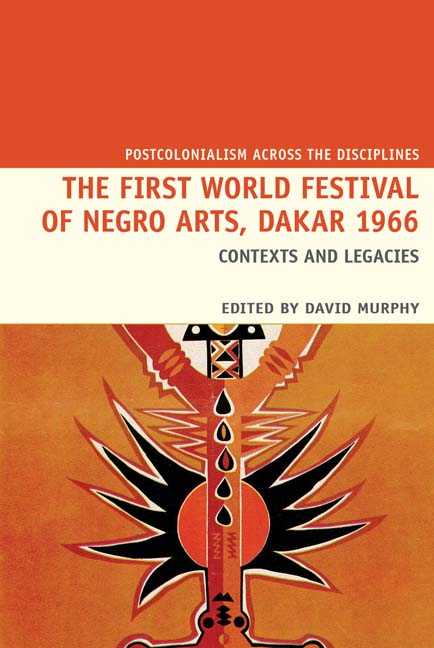Book contents
- Frontmatter
- Contents
- Acknowledgements
- List of Figures
- Notes on Contributors
- Introduction. The Performance of Pan-Africanism: Staging the African Renaissance at the First World Festival of Negro Arts
- I Contexts
- II Legacies
- 6 ‘Negritude is Dead’: Performing the African Revolution at the First Pan-African Cultural Festival (Algiers, 1969)
- 7 Beyond Negritude: Black Cultural Citizenship and the Arab Question in FESTAC ‘77
- 8 Cultural Festivals in Senegal: Archives of Tradition, Mediations of Modernity
- 9 FESMAN at 50: Pan-Africanism, Visual Modernism and the Archive of the Global Contemporary
- 10 PANAFEST: A Festival Complex Revisited
- Books and Films about the 1966 Festival
- Bibliography
- Index
9 - FESMAN at 50: Pan-Africanism, Visual Modernism and the Archive of the Global Contemporary
from II - Legacies
- Frontmatter
- Contents
- Acknowledgements
- List of Figures
- Notes on Contributors
- Introduction. The Performance of Pan-Africanism: Staging the African Renaissance at the First World Festival of Negro Arts
- I Contexts
- II Legacies
- 6 ‘Negritude is Dead’: Performing the African Revolution at the First Pan-African Cultural Festival (Algiers, 1969)
- 7 Beyond Negritude: Black Cultural Citizenship and the Arab Question in FESTAC ‘77
- 8 Cultural Festivals in Senegal: Archives of Tradition, Mediations of Modernity
- 9 FESMAN at 50: Pan-Africanism, Visual Modernism and the Archive of the Global Contemporary
- 10 PANAFEST: A Festival Complex Revisited
- Books and Films about the 1966 Festival
- Bibliography
- Index
Summary
In the spring of 1966, the eyes and ears of the black world focused on the Premier Festival mondial des arts nègres (FESMAN).In the wake of decolonization, artists and intellectuals convened for almost a month of discussions, performances and festivities in Dakar. The official rhetoric of the host nation focused on the event as a celebration of a shared black condition, advancing a belief in Negritude as a viable tool for the expression and reconciliation of blackness and modernity. Most historians cite the 1956 and 1959 Black Artists and Writers Congresses held in Paris and Rome respectively as precedents. In fact, these were part of a much broader set of cultural proceedings in the immediate post-war era that took as their remit the task of reclaiming denigrated heritages, seeking viable political alliances, envisioning liberated futures and imagining new humanisms. Each of these gatherings, aimed at addressing the pressing political shifts of the day, did so with a steadfast belief in the central role culture could play in the process of nation-building and the fashioning of postcolonial subjectivities. Recognizing the profound imbrication of modernist vanguardism and the colonial project, these events also invested deeply in modes of exhibitionism to foster transparency, accountability and dialogue.
In 1955, in the hopeful early days of Nasser's pan-Arabism, Alexandria hosted the ‘Biennale de la Méditerranée’, one of the first visual arts biennales on the continent. Like other events of its kind, it ‘sought to use the display of recent art as the means to loop back to a glorious era of local art production so as to resurrect the city's international and cultural status’ (Gardner and Green 2013: 444). In that same year, the heady declarations of the Bandung Conference set the tone for Third World solidarity and dialogue. Against the growing divisions of the Cold War, in 1958, the Soviets hosted creative and political exchanges at the Afro-Asian Writers’ Conference in Tashkent. In 1962, Frank McEwen organized The First International Congress of African Art and Culture at the Salisbury National Gallery in what was then colonial Rhodesia. This cultural arts festival anticipated both the form and feel of FESMAN, attracting notable international attendees such as the first director of the Museum of Modern Art (MoMA), Alfred Barr, artists Tristan Tzara and Roland Penrose and scholars William Fagg and Michel Leiris.
- Type
- Chapter
- Information
- The First World Festival of Negro Arts, Dakar 1966Contexts and legacies, pp. 190 - 203Publisher: Liverpool University PressPrint publication year: 2016



